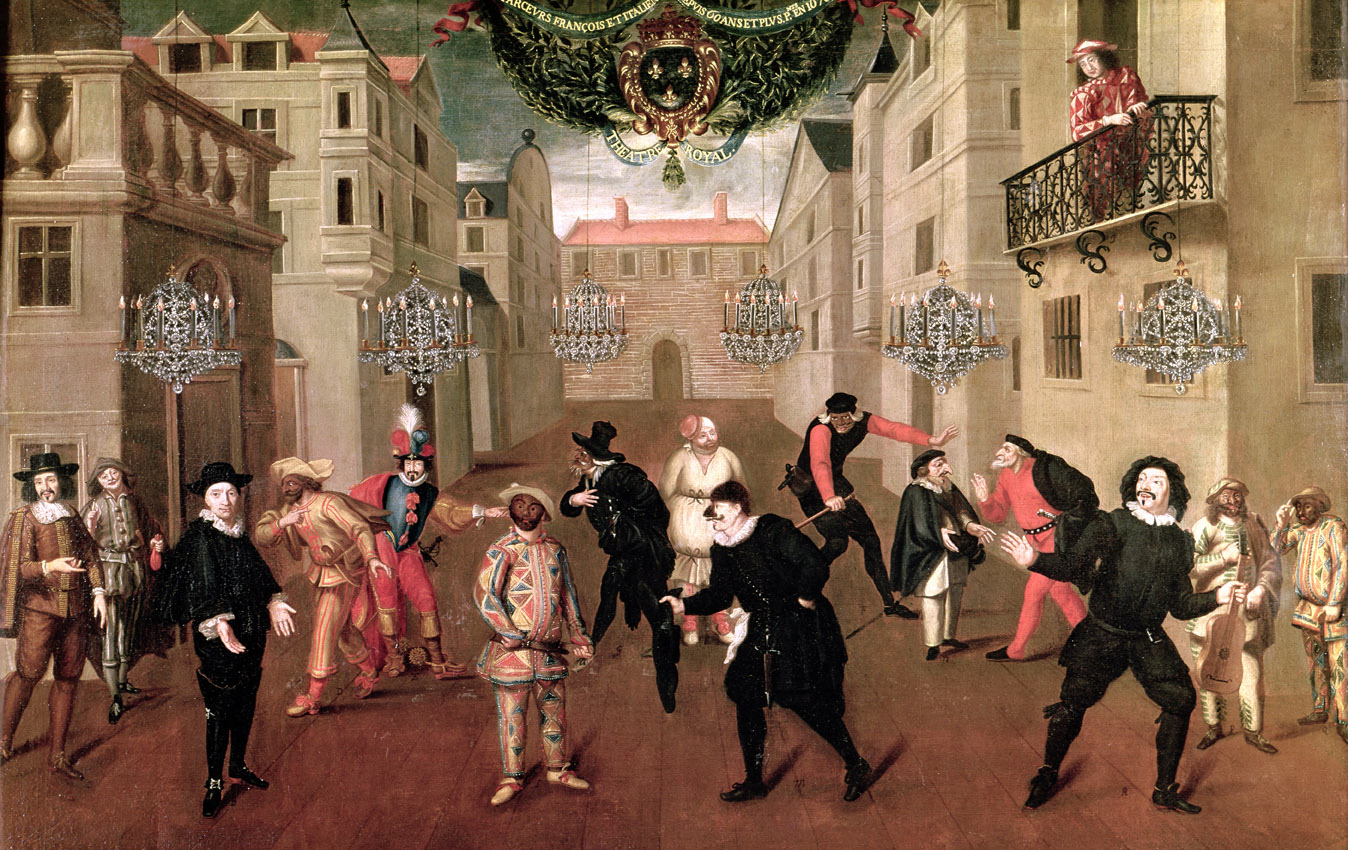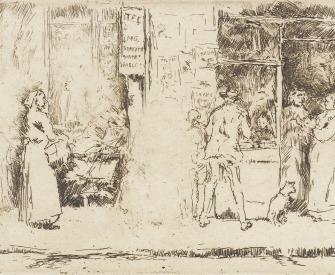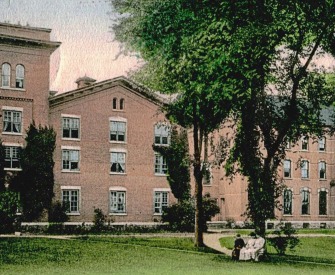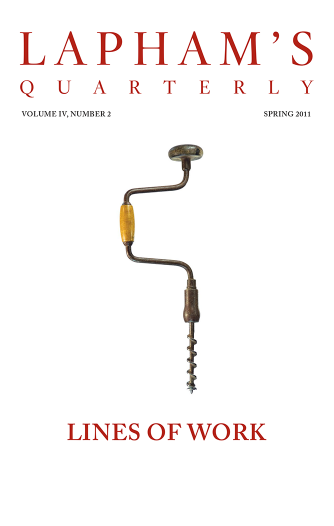Petruchio: Good morrow, Kate, for that’s your name, I hear.
Katherine: Well have you heard but something hard of hearing.
They call me Katherine that do talk of me.
Petruchio: You lie, in faith, for you are called plain Kate,
And bonny Kate, and sometimes Kate the cursed,
But Kate, the prettiest Kate in Christendom,
Kate of Kate Hall, my superdainty Kate—
For dainties are all cates, and therefore “Kate”—
Take this of me, Kate of my consolation:
Hearing thy mildness praised in every town,
Thy virtues spoke of, and thy beauty sounded—
Yet not so deeply as to thee belongs—
Myself am moved to woo thee for my wife.
Katherine: Moved? In good time. Let him that moved you hither
Re-move you hence. I knew you at the first
You were a movable.
Petruchio: Why, what’s a movable?
Katherine: A joint stool.
Petruchio: Thou hast hit it. Come, sit on me.
Katherine: Asses are made to bear, and so are you.
Petruchio: Women are made to bear, and so are you.
Katherine: No such jade as you, if me you mean.
Petruchio: Alas, good Kate, I will not burden thee,
For knowing thee to be but young and light.
Katherine: Too light for such a swain as you to catch,
And yet as heavy as my weight should be.
Petruchio: Should be?—should buzz.
Katherine: Well taken, and like a buzzard.
Petruchio: O slow-winged turtle, shall a buzzard take thee?
Katherine: Aye, for a turtle, as he takes a buzzard.
Petruchio: Come, come, you wasp, i’faith you are too angry.
Katherine: If I be waspish, best beware my sting.
Petruchio: My remedy is then to pluck it out.
Katherine: Aye, if the fool could find it where it lies.
Petruchio: Who knows not where a wasp does wear his sting?
In his tail.
Katherine: In his tongue.
Petruchio: Whose tongue?
Katherine: Yours, if you talk of tales, and so farewell.
Petruchio: What, with my tongue in your tail? Nay, come again,
Good Kate, I am a gentleman.
Katherine: That I’ll try. [She strikes him]
Petruchio: I swear I’ll cuff you if you strike again.
Katherine: So may you lose your arms.
If you strike me you are no gentleman,
And if no gentleman, why then, no arms.
Petruchio: A herald, Kate? O, put me in thy books.
Katherine: What is your crest—a coxcomb?
Petruchio: A combless cock, so Kate will be my hen.
Katherine: No cock of mine. You crow too like a craven.
Petruchio: Nay, come, Kate, come. You must not look so sour.
Katherine: It is my fashion when I see a crab.
Petruchio: Why, here’s no crab, and therefore look not sour.
Katherine: There is, there is.
Petruchio: Then show it me.
Katherine: Had I a glass I would.
Petruchio: What, you mean my face?
Katherine: Well aimed, of such a young one.
Petruchio: Now, by St. George, I am too young for you.
Katherine: Yet you are withered.
Petruchio: ’Tis with cares.
Katherine: I care not.
Petruchio: Nay, hear you, Kate. In sooth, you scape not so.
Katherine: I chafe you if I tarry. Let me go.

The French and Italian Comic Actors of the Past Sixty Years and More, attributed to Verrio, 1670. Comédie Française, Paris, France, Giraudon, The Bridgeman Art Library.
Petruchio: No, not a whit. I find you passing gentle.
’Twas told me you were rough, and coy, and sullen,
And now I find report a very liar,
For thou art pleasant, gamesome, passing courteous,
But slow in speech, yet sweet as springtime flowers.
Thou canst not frown. Thou canst not look askance,
Nor bite the lip, as angry wenches will,
Nor hast thou pleasure to be cross in talk,
But thou with mildness entertain’st thy wooers,
With gentle conference, soft, and affable.
Why does the world report that Kate doth limp?
O slanderous world! Kate like the hazel twig
Is straight and slender, and as brown in hue
As hazelnuts, and sweeter than the kernels.
O let me see thee walk. Thou dost not halt.
Katherine: Go, fool, and whom thou keep’st command.
Petruchio: Did ever Dian so become a grove
As Kate this chamber with her princely gait?
O, be thou Dian, and let her be Kate,
And then let Kate be chaste and Dian sportful.
Katherine: Where did you study all this goodly speech?
Petruchio: It is extempore, from my mother wit.
Katherine: A witty mother, witless else her son.
Petruchio: Am I not wise?
Katherine: Yes, keep you warm.
Petruchio: Marry, so I mean, sweet Katherine, in thy bed.
And therefore setting all this chat aside,
Thus in plain terms: your father hath consented
That you shall be my wife, your dowry ’greed on,
And will you, nill you, I will marry you.
Now, Kate, I am a husband for your turn,
For by this light, whereby I see thy beauty—
Thy beauty that doth make me like thee well—
Thou must be married to no man but me,
For I am he am born to tame you, Kate,
And bring you from a wild Kate to a Kate
Conformable as other household Kates.
Here comes your father. Never make denial.
I must and will have Katherine to my wife.
From The Taming of the Shrew. Most of the five-act comedy, including this scene, is part of a play within a play, staged by a lord as a joke at the expense of a drunken tinker. In the final scene, Katherine delivers the longest speech in the play, in which she declares, “I am ashamed that women are so simple/To offer war where they should kneel for peace,/Or seek for rule, supremacy, and sway,/When they are bound to serve, love, and obey.” Petruchio responds, “Why, there’s a wench!—Come on, and kiss me Kate.”
Back to Issue




